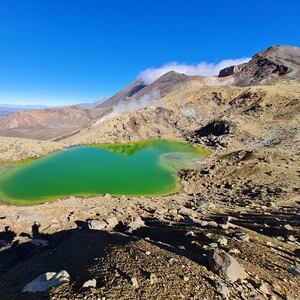Politics
Foreign Tourists to Pay New Fees for Popular Conservation Sites

Foreign tourists visiting some of New Zealand’s most renowned Department of Conservation (DoC) sites and walking tracks will soon be subject to fees ranging from $20 to $40. Prime Minister Christopher Luxon announced this new charge during the National Party conference held in Christchurch. The fee will primarily target popular destinations where foreign visitors constitute a significant percentage of total foot traffic.
The initial sites affected by this fee include Cathedral Cove/Te Whanganui-a-Hei, the Tongariro Crossing, the Milford Track, and Aoraki Mt Cook. According to Tama Potaka, the Minister of Conservation, foreign tourists account for approximately 80 percent of visitors at these locations. The Prime Minister emphasized the economic contributions made by tourists, noting that many travelers express surprise at the ability to access some of the country’s most stunning landscapes without charge.
Luxon explained, “Tourists make a massive contribution to our economy, and no one wants that to change. But I have heard many times from friends visiting from overseas their shock that they can visit some of the most beautiful places in the world for free. It’s only fair that at these special locations, foreign visitors make an additional contribution of between $20 and $40 per person.”
This initiative aims to generate revenue that can be reinvested into the maintenance and preservation of New Zealand’s natural attractions. The funds collected will help ensure that these sites remain accessible and well-maintained for both international tourists and local residents.
Impact on Tourism and Conservation Efforts
The introduction of this fee comes as New Zealand continues to grapple with the effects of the COVID-19 pandemic on its tourism sector. With international travel gradually rebounding, the government is keen to balance welcoming tourists with sustainable management of its natural resources. This fee structure seeks to create a more equitable system where foreign visitors contribute to the upkeep of the sites they enjoy.
While the government anticipates that the new charges will help offset some of the operational costs associated with these popular destinations, it remains to be seen how this will affect overall tourist numbers. Some industry experts have expressed concerns that the additional fees might deter potential visitors, while others believe that the unique allure of New Zealand’s landscapes will continue to attract tourists despite the charges.
Officials have clarified that the fee will be implemented gradually, with specific details regarding payment methods and enforcement expected to be announced in the coming months. The government is committed to ensuring that the implementation is smooth and does not inconvenience travelers.
As this policy unfolds, it will be essential to monitor its impact on both tourism revenue and the preservation of New Zealand’s stunning natural heritage. The balance between accessibility and conservation remains a critical conversation as the country moves forward in revitalizing its tourism industry.
-

 World3 months ago
World3 months agoTest Your Knowledge: Take the Herald’s Afternoon Quiz Today
-

 Sports3 months ago
Sports3 months agoPM Faces Backlash from Fans During Netball Trophy Ceremony
-

 Lifestyle3 months ago
Lifestyle3 months agoDunedin Designers Win Top Award at Hokonui Fashion Event
-

 Sports3 months ago
Sports3 months agoLiam Lawson Launches New Era for Racing Bulls with Strong Start
-

 Lifestyle3 months ago
Lifestyle3 months agoDisney Fan Reveals Dress Code Tips for Park Visitors
-

 Health3 months ago
Health3 months agoWalking Faster Offers Major Health Benefits for Older Adults
-

 World3 months ago
World3 months agoCoalition Forms to Preserve Māori Wards in Hawke’s Bay
-

 Politics3 months ago
Politics3 months agoScots Rally with Humor and Music to Protest Trump’s Visit
-

 Top Stories3 months ago
Top Stories3 months agoUK and India Finalize Trade Deal to Boost Economic Ties
-

 Entertainment3 months ago
Entertainment3 months agoExperience the Excitement of ‘Chief of War’ in Oʻahu
-

 World3 months ago
World3 months agoHuntly Begins Water Pipe Flushing to Resolve Brown Water Issue
-

 Science3 months ago
Science3 months agoNew Interactive Map Reveals Wairarapa Valley’s Geological Secrets









